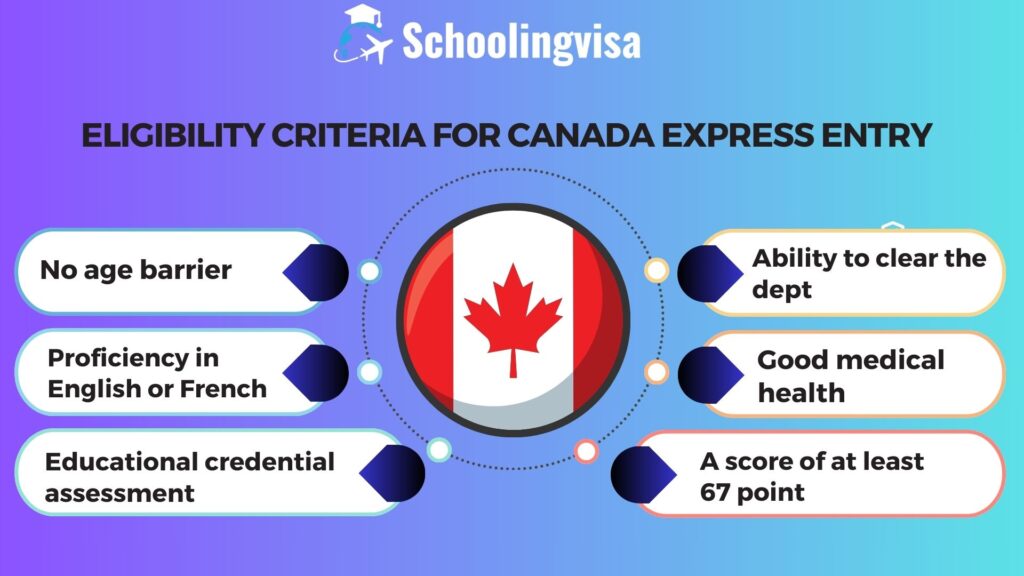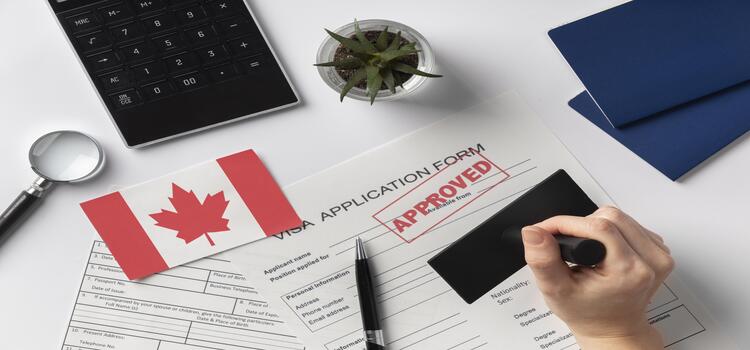What is the Express Entry in Canada
Express Entry, established by the Immigration, Refugees, and Citizenship Canada (IRCC) in 2015, is a merit-based framework for Canadian immigration. Through this system, the Canadian government can oversee applications from skilled workers seeking permanent residency in Canada.
Candidates with the most elevated scores are extended an Invitation to Apply (ITA) for permanent residence in Canada.
There are three Canadian immigration programs under Canada’s Express Entry –
- The Federal Skilled Trades Program (FSTP)
- The Federal Skilled Worker Program (FSWP)
- The Canadian Experience Class (CEC)
- Canada Category-Based Selection
1. Federal Skilled Worker Program (FSWP):
Key Requirements:
- Work Experience: You must have at least one year of continuous full-time (or equivalent part-time) work experience in a skilled occupation within the last 10 years.
- Skilled Occupation: Your work experience must be in a skilled occupation, which is classified under the National Occupational Classification (NOC) system.
- Language Proficiency: You need to demonstrate proficiency in English or French through a language test (e.g., IELTS or CELPIP for English, or TEF for French).
- Education: You must have completed a Canadian secondary or post-secondary educational credential or an Educational Credential Assessment (ECA) report from an approved organization.
2. Federal Skilled Trades Program (FSTP):
Key Requirements:
- Work Experience: Have at least two years of full-time work experience (or an equivalent amount of part-time work) in a skilled trade within the five years before applying.
- Language Proficiency: Meet the required language levels for each language ability (speaking, reading, writing, and listening) in English or French.
- Job Offer or Certificate of Qualification: You must either have a valid job offer for a full-time position for at least one year or a certificate of qualification in your skilled trade issued by a Canadian provincial, territorial, or federal authority.
3. Canadian Experience Class (CEC):
Key Requirements:
- Work Experience in Canada: Have at least one year of full-time (or an equivalent amount in part-time) skilled work experience in Canada within the last three years before applying.
- Language Proficiency: Meet the language requirements in English or French.
- Plan to Live Outside of Quebec: Express Entry does not apply to the province of Quebec. If you plan to live in Quebec, you should apply through the Quebec Skilled Worker Program.
General Express Entry Requirements:
- Express Entry Profile: You must create an online Express Entry profile and receive an invitation to apply for permanent residence.
- Comprehensive Ranking System (CRS): Obtain a certain score in the CRS based on factors such as age, education, work experience, language proficiency, and adaptability.
- Admissibility: You must be admissible to Canada, meaning you must not pose a security risk, have serious criminal convictions, or pose a risk to public health or safety.
It’s important to note that these are general guidelines, and specific requirements may vary. It’s recommended to check the official Immigration, Refugees, and Citizenship Canada (IRCC) website for the most up-to-date and detailed information or consult with an immigration professional for personalized advice.
What is the Eligibility Criteria for Canada Express Entry?

The criteria for eligibility in the Express Entry system encompass several key aspects:
Nomination Possibility:
- Qualification for nomination under any visa program.
Minimum Score Requirement:
- Attaining a score of at least 67 points or more to meet the eligibility criteria for the Federal Skilled Worker (FSW) Program.
Language Proficiency Test:
- Successful completion of a language proficiency test to demonstrate sufficient knowledge of either English or French.
Educational Credential Assessment (ECA):
- A positive Educational Credential Assessment (ECA) report, verifying the equivalence of foreign educational qualifications to Canadian standards.
Health Criteria:
- Maintaining good medical health to meet the health criteria.
Financial Requirement:
- Fulfilling the financial requirements specified by the immigration authorities.
Character Assessment:
- Demonstrating good character and meeting the character assessment criteria.
Specific Program Criteria:
- Meeting specific eligibility criteria tailored to the selected immigration program.
Minimum Points for EE Profile:
- Achieving a minimum of 67 points to establish your Express Entry profile.
PR Application Submission:
- Submitting the Permanent Residency (PR) application only after receiving an Invitation to Apply (ITA) from Immigration, Refugees and Citizenship Canada (IRCC).
CRS Score Significance:
- The higher your Comprehensive Ranking System (CRS) score in the Express Entry pool, the more favorable your chances of securing an ITA.
Category-Based Selection Focus:
- In 2023, emphasis is placed on category-based selection, prioritizing specific occupations in healthcare, STEM (Science, Technology, Engineering, and Mathematics), trade, agriculture, and agri-food.
What Documents are Required for the Express Entry Canada PR Visa?

The specific documents required for the Express Entry Canada PR (Permanent Residence) visa application may vary based on your individual circumstances and the federal economic immigration program you are applying under (such as the Federal Skilled Worker Program, Federal Skilled Trades Program, or Canadian Experience Class). However, here is a general list of documents commonly required for Express Entry applications:
1. Personal Documents:
- Passport: A copy of your passport or travel document showing your personal details and passport validity.
- Birth Certificate: A copy of your birth certificate or an alternative document proving your date and place of birth.
- Marriage Certificate or Proof of Common-law Union: If applicable, provide a marriage certificate or proof of common-law union.
- Divorce or Separation Documents: If applicable, provide divorce or separation documents.
2. Educational Documents:
- Educational Credential Assessment (ECA): An ECA report assessing the equivalency of your foreign educational credentials to Canadian standards.
- Transcripts and Diplomas: Copies of your educational transcripts and diplomas.
3. Language Proficiency:
- Language Test Results: Results of an approved language test (e.g., IELTS, CELPIP, or TEF) demonstrating proficiency in English and/or French.
4. Work Experience:
- Reference Letters: Letters from previous employers confirming your work experience, including job titles, duties/responsibilities, duration of employment, and relevant details.
5. Proof of Funds:
- Proof of Funds: Evidence of sufficient funds to support yourself and your family members (if applicable) upon arrival in Canada.
6. Provincial Nomination (if applicable):
- Provincial Nomination Certificate: If you have obtained a provincial nomination through a Provincial Nominee Program (PNP), provide the nomination certificate or letter.
7. Additional Documents:
- Police Clearance Certificate: A police clearance certificate or record from each country or territory where you have lived for six months or longer since the age of 18.
- Medical Examination: Proof of completing a medical examination by an approved panel physician.
- Photographs: Recent passport-sized photographs meeting specified requirements.
- Other Supporting Documents: Any additional documents requested by Immigration, Refugees and Citizenship Canada (IRCC) or specified in the application instructions.
It’s important to carefully review the document requirements outlined by IRCC for the specific immigration program you are applying under. Additionally, ensure that all documents are authentic, accurate, and properly translated into English or French if required. Working with an immigration consultant or lawyer can help ensure that your application is complete and meets all requirements.
Costs of Canada Express Entry in 2024?
The Canada Express Entry system serves as a widely chosen pathway for skilled workers seeking immigration. Nevertheless, there are associated fees that applicants need to consider. The primary applicant incurs a fee of $1,325, with an equivalent amount required for a spouse or common-law partner. Additionally, there is a charge of $225 for each dependent child. Biometric data collection involves an extra cost of $85 per individual or $170 for a family. It’s essential to note that these fees are denominated in Canadian dollars and, in certain instances, are non-refundable. Therefore, ensuring eligibility before initiating the application process is paramount.


